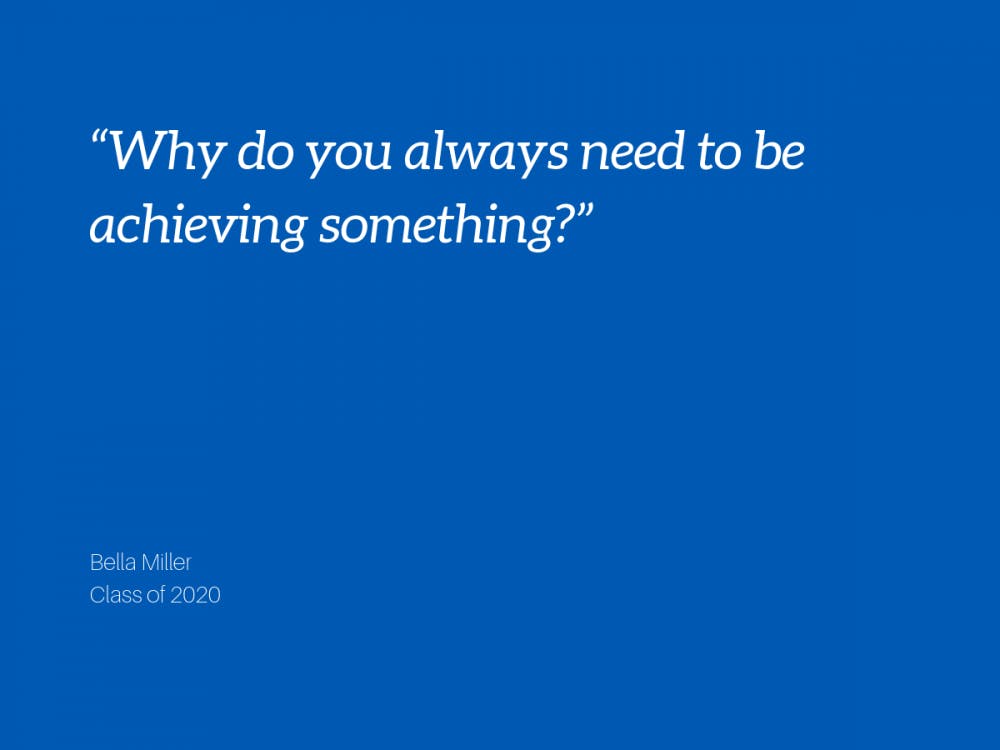It was 4:14 a.m. on a Friday night—or Saturday morning—and I was up the wall with frustration. My insomnia and sensitivity to caffeine had gotten the best of me and for two hours, and I’d been summoning sleep with no success. There was nothing productive I could be doing. But still, this idle time haunted me—it was cutting into the time and energy I had carefully allotted to my productive Saturday schedule. And then I confronted a question my boyfriend asked me a few weeks earlier.
“Why do you always need to be achieving something?”
Since then this question has unfolded into a cascade of equally perturbing ones. Why do I feel guilty when I’m not getting something done? Why not allow days to unfold naturally? Am I really being present in my life if my mind is always engaged in the pursuit of checking boxes? What does this mindset say about my value system?
Sadly, I know I’m not alone in this at Duke, that this hyper-productive mentality is actually an aspect central to Duke’s culture. Our most common social practice is asking someone to grab lunch. As feeding our bodies is something we have to do anyway, lunch is functionally the easiest way to spend time with each other without actually sacrificing “productive” time.
With the intersection of prestigious academia and success-oriented people, it makes sense that we as a University are absolutely sprinting on the hedonic treadmill. When we achieve one goal, we move on to the next, and the next and the next. This level of aspiration and passion is amazing—it’s likely one of the reasons we got into Duke and it will likely propagate future success. However, this success-oriented mentality needs limits if it’s going to be as conducive to happiness as it is to productivity.
Unless we think that we are only as valuable as what we achieve, we should not be striving to be productive all the time. Conventional ideas of productivity do not leave much room for personal reflection, investment in meaningful relationships, the celebration of what we have done, self-care, fun or the simple appreciation of the fact we are alive. This desire to constantly be productive strips us from the present moment and places us into a series of boxes to check. It doesn’t give us the time to celebrate what we have done and are doing because we are incessantly thinking about what we haven’t done.
I of all people am in no place to tell anyone how to more present and less plagued by toxic productivity, so I won’t. The reality is that there is no one definitive answer, because we are individuals who find meaning in completely different ways. I’ve found that my peace of mind lies in daily walks in the Duke Forest or Eno State Park and each time listening to a different album start to finish.
Despite this campus-wide addiction, we as a Duke community carry with us a multitude of ways we ground ourselves. So, I’m compiling the self-care insight from others to learn how to better balance productivity with actually living. On brand with my stress regimen, I’m in Vondy at the moment surrounded by people hard at work on a not-so-lazy Sunday, so I solicited their advice.
“Mary Oliver has a collection of poems all based in nature,” junior Caroline Olsen told me. “I’ve read them in many meaningful places and I continue to read them here. It makes me take a step back and return to the place that the book creates for me. I also like to juggle, it gives me a sense of control when everything else is out of control.”
Our conversation was interrupted when we realized that someone was doing headstands on the grass outside Vondy. This is the level of relaxation I strive to reach.
“Every morning I take out an hour for myself in which I don’t have to do anything before I start my day; it sets the tone,” said senior Madelyn Winchester. “I also like to have a craft project going on the side. I was weaving for a while.”
I turned to Daria Patterson, another senior, who told me she’s not a good person to ask, as she is “really bad at stress management.”
Sophomore Jake Jeffries told me that he meticulously schedules his day, which seemed pretty counterintuitive to me. However, he told me he schedules in order to plan chunks of his day in which he can let himself do absolutely nothing. These chunks include the entirety of Friday and Saturday, he said. “That way, I prioritize just enjoying myself on these days and plan around it. Plus I get to feel completely present, having no guilt.”
Turning to Amelia Shunk, a busy sophomore rower, I was pleasantly surprised by her ability to focus on self-care. “I practice mindfulness, I meditate, and I try to simply let it go. Also, having gotten in to Duke for something other than my academics reminds me that I am so much more than my academics. I think mindset is the most important thing.”
After taking this time to have conversations about relaxation, self-care and being present, I found myself breathing more deeply. I’m actually feeling less stressed about my paper and I decided against cancelling the plans that I made tomorrow—in the spirit of self-care. I hope that those of us with an addiction to productivity make strides to step back and simply be present, and I hope that those who are already practiced will keep on keepin’ on.
Bella Miller is a Trinity senior. Her column, “keep Duke weird,” runs on alternate Tuesdays.
Get The Chronicle straight to your inbox
Signup for our weekly newsletter. Cancel at any time.

